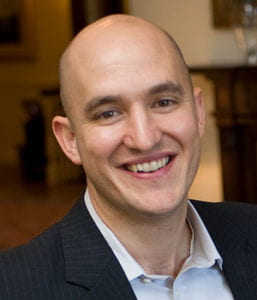“I try to use behavioral science methods and tools to address important social problems. Those tools are valuable and useful, and it turns out that we don’t have a shortage of important social problems.”
 An interview with Todd Rogers, PhD
An interview with Todd Rogers, PhD
Professor of Public Policy, Harvard Kennedy School
By: Michelle Johnson (2/28/20)
Were you always interested in research?
I was a political pollster after college, and then I realized there was a science of behavior change that wasn’t used in politics. I went and got my PhD at Harvard jointly in psychology, economics, political science, and the business school; I described it as the science of behavior change. Then I left academia, thought I was leaving for good, and co-founded a research institute called the Analyst Institute in DC where we translated behavioral science insights into political strategy for the left. We worked with Obama’s campaigns and the labor unions, environmental groups, same sex marriage groups, pro-choice groups, et cetera, and worked on persuasion, fundraising, volunteer recruitment, get out the vote, using large field experiments and behavioral insights.
After four years of that, I decided I wanted to do education research, and so I left and returned to academia—this is about 9 or 10 years ago—and shifted entirely doing the same kind of approach. How do we mobilize families to support kids outside of school? The majority of my research is on field experiments in schools K-12 in the U.S., UK, and Canada translating behavioral insights into scalable interventions to mobilize and support families. I still have some political projects though.
What’s the research project you’re most excited about now?
At MINDCORE I am discussing research about when one side has a much bigger voice than the other side, and the louder side is being dishonest or hypocritical. How do you respond? How can you possibly neutralize that kind of messaging?
I really love this paper, and I have enjoyed pretty profoundly getting to work with Bob Cialdini, who has been a hero of mine since I understood what psychology was, and getting to work with Jessica Lasky-Fink, who is an amazing doctoral student at Berkeley. I just enjoy this project so much—it’s the application of really basic psychology to business communications, politics, electoral context that doesn’t seem to be really widely used, but is really powerful, especially when public communicators are being dishonest.
Is the application of your research a primary motivator for you?
I try to do useful behavioral science, and it turns out most behavioral science is useful, so that filter isn’t as severe as you might think. I try to use behavioral science methods and tools to address important social problems. Those tools are valuable and useful, and it turns out that we don’t have a shortage of important social problems.
What do you think people should know about the research process?
One, the world does not reveal causality very clearly, and so it’s incredibly hard in the world to determine whether something causes something else. But our mental apparatus is built to infer causal patterns. For this reason it’s really difficult to disabuse ourselves of our beliefs about things being caused by the processes that we think we understand. Randomized experiments are probably the most powerful thing the behavioral sciences can contribute to the world in addition to the insights and the understanding of how the mind and behavior works. As I work in school districts, it’s astonishingly hard for leaders to be able to suss out whether the claims of some motivated vendors are true or not. Randomized experiments are the most powerful tool we have for providing that help to leaders.
The second is that treatment effects tend to be small for everything in the world. There are no silver bullets, and we often promote outsized effects, but in the world it’s hard to change behavior with any kind of intervention, behavioral or otherwise. I think we would all be better off if we tempered our expectations about how big effect sizes can be or should be.
To learn more about Dr. Rogers and his work, click here.
Click here to go back to the “Interviews with Scientists” page.
